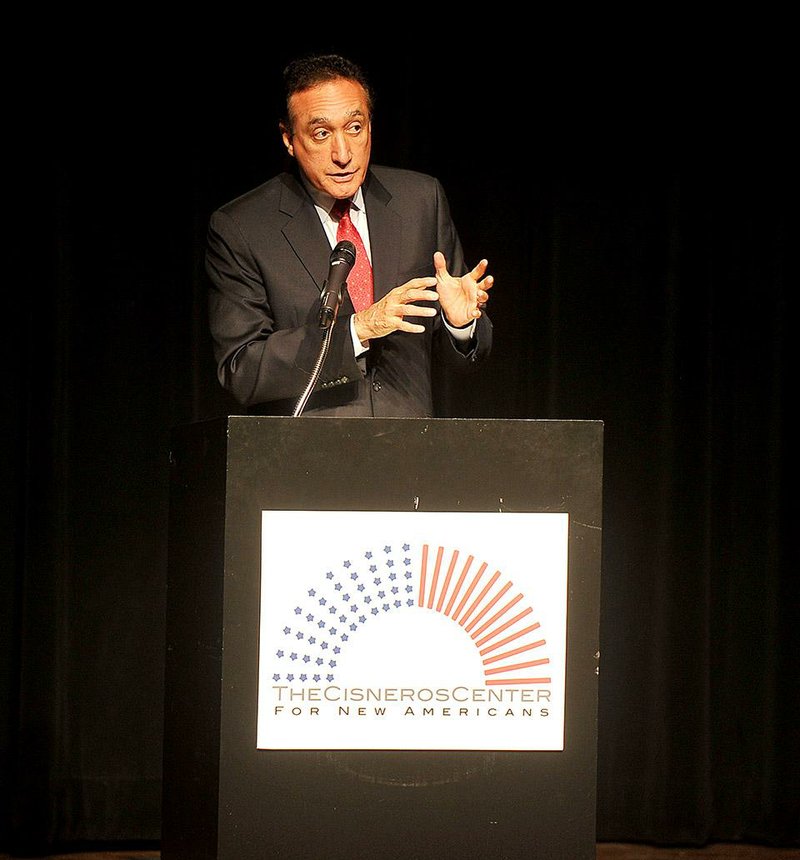A former secretary of the U.S. Housing and Urban Development Department under President Bill Clinton has chosen Northwest Arkansas to start his new initiative to foster immigrant integration in communities.
Henry Cisneros, who participated in Clinton's first presidential campaign and had a hand in writing the speech for Clinton's second inaugural address, was appointed by Clinton to head HUD in 1992 and stayed in that role until 1997.
He's now the founder of the Cisneros Center for New Americans, executive chairman of CityView and co-chairman of the Bipartisan Policy Center's Immigration Task Force and Housing Commission.
Northwest Arkansas -- specifically Springdale and Rogers -- was chosen as the site to start his American Dream Initiative, which employs three fellows who will work to identify the needs of the immigrant community, determine what the service gaps are and facilitate with immigrants' integration into the American lifestyle.
The three are Jennifer Aguirre of Houston, Jessica Boyd of Little Rock and Jacob Perry of Fayetteville.
"Our objective is to leave things permanently in place that wouldn't have happened if we weren't there," Cisneros said Friday in response to a question from a woman who was one of dozens to attend Cisneros' noon speech at the University of Arkansas Clinton School of Public Service.
"Imagine Northwest Arkansas as the prototype for the country on how a rural community that's growing into urban addresses this issue and becomes a model on how you integrate immigrants. Because that same model can play out across hundreds and thousands of other places across the nation."
Cisneros is the grandson of an immigrant and in 1981 became the first Hispanic mayor of a major U.S. city -- San Antonio.
His talk Friday focused on both the politics and economics of immigration in the country and the real-life situations immigrants face daily. He spoke of the millions of immigrants already living in the U.S. and how the government is approaching them in terms of legislation.
"We know the immigrant population is going to be large, but is it going to be large, undereducated, undercompensated, alienated and a negative in the American future? Or is it going to be large, a source of youthful energy, a source of creative ideas?" Cisneros said. "We haven't figured out how we are going to integrate these immigrants in the ways that matter. In the educational system, in the development of talent and so forth."
There's two parts to doing that successfully, he told the group, and that's having welcoming communities with the appropriate resources and then immigrants agreeing to do their part. Immigrants must agree to learn English and the civic traditions of this country, as well as the law and what it takes to be a productive citizen, Cisneros said.
A Clinton school student questioned where Cisneros drew the line between integration and assimilation. Cisneros said immigrants are capable of adding a level of understanding without losing their identity.
"I will carry my home country in my heart, but I understand now I am here. I commit to the obligations of life in the United States and how to advance my family and how to contribute to society. That's the big picture, the over-arching logic," he said.
Cisneros spoke in Fayetteville on Thursday about the initiative.
After its pilot program in Northwest Arkansas, the American Dream Initiative is planned to expand to other communities that have experienced significant growth in immigrant population and where immigrant services aren't fully developed.
University of Arkansas sociology professor Bill Schwab said Northwest Arkansas is the perfect place to start the program, noting that he's done a lot of the groundwork in his one-year study of the area's immigrant population. He said the area is more diverse than people realize, adding that 54 languages are spoken and there is not only a Hispanic immigrant population, but there are immigrants from the Marshall Islands, Vietnam, Cambodia and India.
"All this growth has occurred relatively recently, in the last 20 years. This program specifically focuses on communities like ours," he said. "... There's been this dramatic increase in immigrant population and it turns out it's a welcoming community. I've heard that from across the board. And they have a high probability of being successful here where there's Wal-Mart and Tyson, who are partners in seeing [the American Dream Initiative] is a successful program."
Information for this article was contributed by Jaime Adame of the Arkansas Democrat-Gazette.
Metro on 10/25/2014
